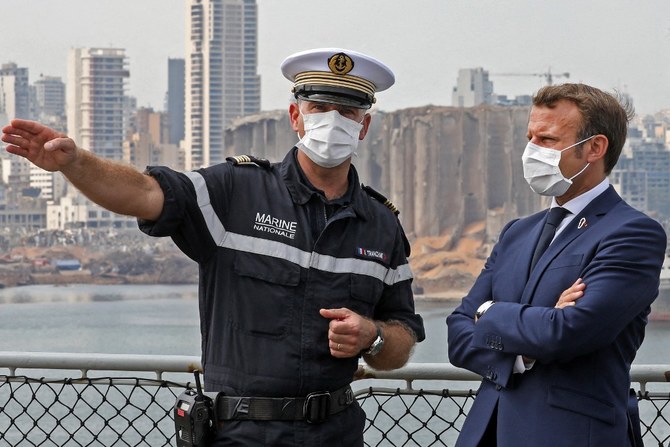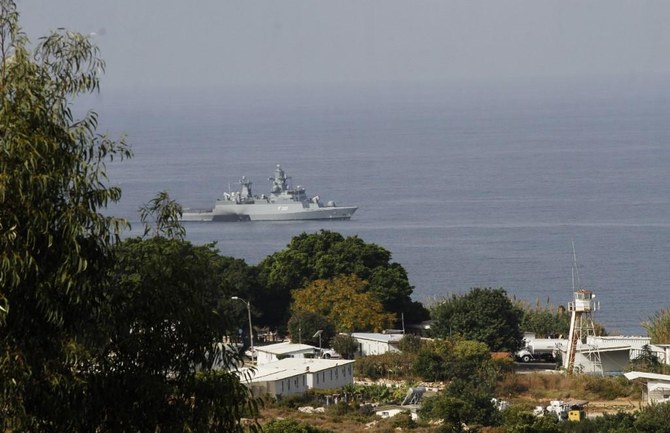
by NAJIA HOUSSARI -- arabnews.com -- BEIRUT: As the UN hosted a second International Conference on Assistance and Support to Beirut on Wednesday, there was growing impatience among donors with Lebanese politicians. The virtual event, chaired by French President Emmanuel Macron and UN Secretary-General António Guterres, aimed to coordinate international aid efforts in support of the Lebanese people as the country continues to face political, economic and social challenges. The participants — including heads of state, international organizations, donors, NGOs and civil-society representatives — discussed the results of the first conference, which was organized by France after the Beirut port explosion and held on Aug. 9. It resulted in pledges of aid worth about $300 million in a fund managed by the World Bank that will be channeled through UN agencies and NGOs rather than Lebanese state institutions.
However, delegates expressed impatience with the failure of political factions in Lebanon to resolve their differences and work together for the good of their country. Four months after the Aug. 4 explosion in Beirut, and the subsequent resignation of Hassan Diab’s government, a new government has yet to be formed, delaying the economic and political reforms needed to begin efforts to resolve the financial crisis. According to Reuters, the French presidency on Wednesday said: “No measures required in the French road map for Lebanon have been implemented and the Lebanese Central Bank’s accounts haven’t been audited.” It added: “American sanctions imposed on the Lebanese political class have not had any effect so far and will not help in forming a government.” This came after the leak of a conversation in which Dorothy Shea, the US ambassador to Lebanon, asked Nabih Berri, speaker of the Lebanese parliament, to “distance himself from Hezbollah.” She also hinted that “Washington will reject any government in which Hezbollah is represented and there won’t be any foreign aid without radical change.”
/cloudfront-us-east-1.images.arcpublishing.com/mco/IABPREZHUJHPNO47VJMVK7J4DY.jpg)
by defensenews.com - Aaron Mehta -- WASHINGTON — The U.S. State Department on Tuesday cleared six Foreign Military Sales cases, potentially worth a combined total of $1.55 billion. The six cases, spread across South Korea, Saudi Arabia, Brazil, Croatia, Lebanon and Canada, were announced on the website of the Defense Security Cooperation Agency. DSCA announcements mean that the State Department has decided the potential FMS cases meet its standards, but this does not guarantee the sales will happen in their announced forms. Once approved by Congress, the foreign customer begins to negotiate on price and quantity, both of which can change during the final negotiations. Here are the details on each case:
Lebanon: The country seeks to spend $55.5 million to procure 300 M1152 High Mobility Multipurpose Wheeled Vehicles in two tranches of 150 each. Beirut currently operates more than 1,000 HMMWVs of various designs, according to the DSCA, which are primarily used to “counter violent extremist organizations and to secure its border.” The primary contractor would be American General, with work happening in its South Bend, Indiana, facility. This is the first FMS case cleared for Lebanon since the start of the Trump administration.
by naharnet — The new chief of Iran’s Quds Force, General Esmail Ghaani, asked Hizbullah during a recent secret visit to Lebanon …

by NAJIA HOUSSARI -- arabnews.com -- BEIRUT: The fifth round of negotiations regarding the demarcation of the maritime borders between Lebanon and Israel has been postponed until further notice. This announcement came 48 hours prior to talks scheduled to take place on Wednesday. Reuters had quoted a Lebanese security source and an Israeli official saying that “the US-mediated talks were postponed until further notice,” with the Lebanese source blaming the delay on “Israel’s rejection of Lebanese proposals.” The office of the UN Special Coordinator for Lebanon Jan Kubis refused to comment on this move, as did the US Embassy in Beirut. Israel’s Energy Minister Yuval Steinitz had accused Lebanon of “changing its position regarding the maritime borders demarcation seven times,” adding that its positions so far had been “provocative.” His comment came after the fourth round of negotiations, held on Nov. 11 at the UN Interim Force in Lebanon’s (UNIFIL) headquarters in Ras Al-Naqoura. “Lebanon’s position during the fourth round of negotiations not only contradicts its previous positions, but also contradicts Lebanon’s position regarding the maritime borders with Syria, which takes the Lebanese island near the borders into consideration,” he added.
Steinitz also stressed the importance of “adhering to the principle of stability and settling the dispute according to what Israel and Lebanon had submitted to the United Nations. Any deviation from that principle will lead to a dead end,” he warned, hoping for a breakthrough in the upcoming few months. Middle East energy expert Marc Ayoub told Arab News: “The current suspension and postponement of the negotiations is for tactical reasons. Lebanon and Israel are clinging to their positions regarding the starting point of the maritime border demarcation. Lebanon wants it to be Ras Al-Naqoura, while Israel wants to go from unpopulated maritime ridges.” He added: “What is happening is just a rope-pulling process between the two sides. I think that the international community has to play an essential role in solving this issue, as it can benefit from the UNIFIL forces and their equipment to resolve the dispute and identify the coordinates according to international law. “I know that the American mediator will visit Lebanon and Israel to ease the tension and I think that what is happening is an attempt to win some time while waiting for the American decision.”
Khazen History


Historical Feature:
Churches and Monasteries of the Khazen family

St. Anthony of Padua Church in Ballouneh
Mar Abda Church in Bakaatit Kanaan
Saint Michael Church in Bkaatouta
Saint Therese Church in Qolayaat
Saint Simeon Stylites (مار سمعان العامودي) Church In Ajaltoun
Virgin Mary Church (سيدة المعونات) in Sheilé
Assumption of Mary Church in Ballouneh
1 - The sword of the Maronite Prince
2 - LES KHAZEN CONSULS DE FRANCE
3 - LES MARONITES & LES KHAZEN
4 - LES MAAN & LES KHAZEN
5 - ORIGINE DE LA FAMILLE
Population Movements to Keserwan - The Khazens and The Maans
ما جاء عن الثورة في المقاطعة الكسروانية
ثورة أهالي كسروان على المشايخ الخوازنة وأسبابها
Origins of the "Prince of Maronite" Title
Growing diversity: the Khazin sheiks and the clergy in the first decades of the 18th century
Historical Members:
Barbar Beik El Khazen [English]
Patriach Toubia Kaiss El Khazen(Biography & Life Part1 Part2) (Arabic)
Patriach Youssef Dargham El Khazen (Cont'd)
Cheikh Bishara Jafal El Khazen
Patriarch Youssef Raji El Khazen
The Martyrs Cheikh Philippe & Cheikh Farid El Khazen
Cheikh Nawfal El Khazen (Consul De France)
Cheikh Hossun El Khazen (Consul De France)
Cheikh Abou-Nawfal El Khazen (Consul De France)
Cheikh Francis Abee Nader & his son Yousef
Cheikh Abou-Kanso El Khazen (Consul De France)
Cheikh Abou Nader El Khazen
Cheikh Chafic El Khazen
Cheikh Keserwan El Khazen
Cheikh Serhal El Khazen [English]
Cheikh Rafiq El Khazen [English]
Cheikh Hanna El Khazen
Cheikha Arzi El Khazen
Marie El Khazen